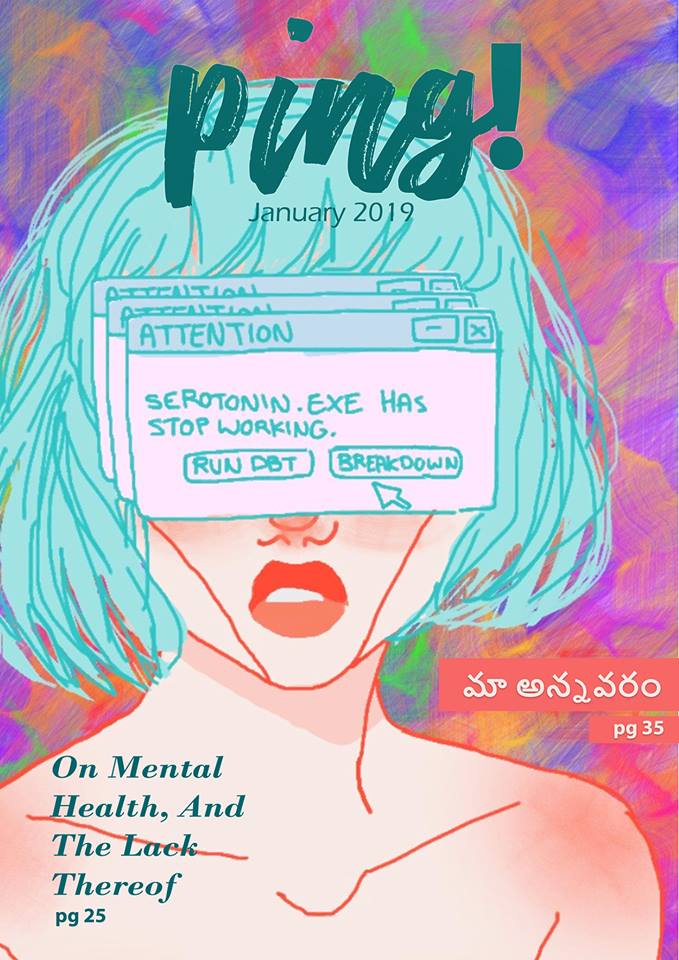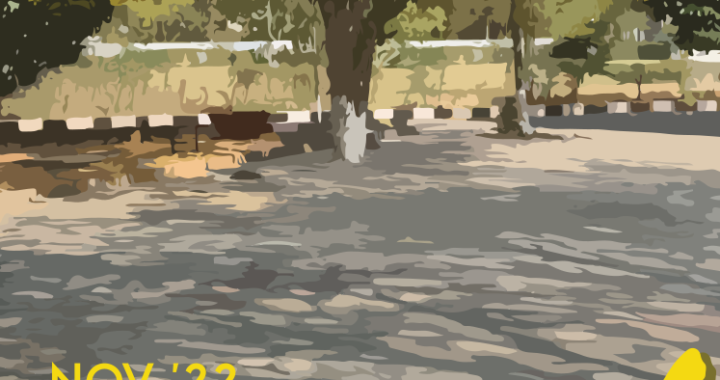January 2019

Comments are closed.
 November 2022
2 min read
November 2022
2 min read
 August 2022
3 min read
August 2022
3 min read
 August 2020
5 min read
August 2020
5 min read
 March 2020
6 min read
March 2020
6 min read
 The Freshers Issue 2k19
1 min read
The Freshers Issue 2k19
1 min read
I usually refrain from discussion, however, I felt there is lot of misinformation in the article about vegetarian and non vegetarian separate seating spaces. I personally like to have meals separately in vegetarian spaces and the major reason is comfort. When I see non vegetarian food in front of me, I think of the animals and how they would have been treated. I really feel for them and I am not comfortable seeing them in the plate. Rather than making any perceptions, I prefer to eat in pure vegetarian spaces. I have extensively travelled (at least 10-15 countries) and I still prefer eating in vegetarian spaces and cook by myself whenever it is not feasible. There is no caste or any other equation at all. And I feel such equations are minimal in IIIT community in general. Hence, the correlation is ill posed. Especially more so, when we are placed in a state like Telangana, where by a recent report from Huffington post says that more than 99% people are non vegetarians.
The non veg food has started in couple of messes now and canteens etc. More are in the pipeline, as I see in emails. People have freedom to eat what they want, and now they have issues if others are not conforming with them. Why can’t you leave this small minority alone and why are you making poor perceptions. Please allow us a little freedom, taste is not the most important aspect for us and we make our choices differently. Why are you not ok, if we make small choices of our own. And interestingly, the article is put in a liberal sense and I feel such mindset is most illiberal, where they are not comfortable with a small minority making their own choices.
I also do not eat onion/garlic and I see clear correlation with many factors of my mind. Its an independent choice and I am quite happy with that. Lets not move towards a scientific community, where “ignorance becomes a point of view”.
Mathew,
Again as I mentioned, I refrain from unnecessary arguments. However, I would just reply to the last statement asked. Different countries have different dynamics and there are many things other countries do, which may never happen in India or might be totally unacceptable. Criticism finding specific examples is extremely low hanging fruit and I never get into such discussions. There are always many examples on the other side too. What I wrote was my personal reason (on the particular aspect in question) and I have known many people which may have similar reasons. A liberal view is to respect that that thought process as well, which is a genuine one. And again in my view, at least in IIIT student community (which is what the article concerns), the caste equations are minimal. I have seen places, with clear divides on such aspects and how separate groups are being formed on such equations (and how they create an unhealthy environment). Our efforts should be in the other direction, to avoid building such walls.
dear prof. Vineeth,
IIIT is not a place where caste equations are minimal; IIIT in fact is a textbook example of the caste hierarchy deep rooted in our academia. Best way to look at it is to analyze how well the power structure of our campus is aligned with the caste hierarchy. To put it in simpler words – ‘ how many of our profs belong to Dalit community ?’ or ‘how many of our house keeping staff belong to a brahmin/banya or say a reddy community?’. At least in the research center I work I am certain that there are no dalit profs and more than 50% of them belong to Brahmin community. And do we know any one from a ‘higher’ caste working as a cleaning staff here ? Same is the case across all our premium technical inquisitions where there is no reservation for backward communities. Our campus appears ‘caste-free’ because we dont have many faculties or students from the under privilieged/ lower caste groups. We do conduct talks about caste and the need for reservation for them , we remember rohit vemula ; but our ‘premium’ institute is not accessible to them. But these ‘invisible’ ( ref Sreedhars article) were part of building this campus; their only stakeholder-ship is in carrying bricks and mortar. There are lactating mothers, under 15 children who helped us build our KCIS and T hub. I am not saying that IIIT employed children to construct the buildings. It could be a third party contractor. But we have always been benefiting from these unbalanced ‘equations.
Demands for a separate seating place for vegetarians need not always be an innocent concern for the right to ‘comfort’. It took us almost 15 years to start a mess serving chicken, although majority of the students wanted it . But it didnt take us that long to start an ultra vegetarian mess serving the interests of a minority religious community. The delay was intentional. There were influential faculties who didnt want it. They used to preach that meat is impure/unhealthy. One of them, during a lecture for the undergrads went on to say that ‘ people who eat meat are not allowed in my house’. There was one faculty from CEH who was ‘sad’ about the introduction of chicken in mess since all these years he has been lecturing how unhealthy meat is, in his HV classes. There are students who were told to stop eating chicken to get better results in their research.
We currently have 4 messes and only one of them serve meat. Still college spent lakhs of rupees building separate kitchen and buying utensils since vegetarians wanted them to be separate. College spent everyone’s money for some people’s exclusivity. People who want exclusivity must go to messes which serve only vegetarian food. And to make it bad, college even agreed to have separate plates. One can understand the concern that a plate is not washed properly. I get plates which are not washed properly and I go clean it myself. There are no food remains – vegetarian or meat, which cant be washed off from a plate. I request prof. Vineeth to think if any of the countries you have traveled keep separate plates in a student mess or how might they react to a request for one. The best a democratic society can do is to ask those who have issues with plates is to get a separate plate for themselves, not to buy for them at everyone’s expense.
Dear Mathew,
In an exclusive environment, those who occupy privileged positions, especially with power, often try to dictate the terms in any discussion. Sometimes it is merely because many of us do not realise that our values are mostly determined by the social order and not simply by free will of the individual.
Just to put it on record, your point of view is appreciated and factual as opposed to the contrary opinions expressed. Any amount of arrogant claim to put you down will not stand the scrutiny of real data and scholarship that exists on the matter.
Incidentally, there is an error in the article – at one place it refers to something like ‘Indian intolerance towards meat eating’. Indians are overwhelmingly non-vegetarian, so there is no question of ‘Indian intolerance’ . There is an upper caste intolerance towards meat eating and with power in their hands, attempts are made to say that this is an innocent matter, even when in the larger society people are killed by mob lynching.
Having said this, it is true that it will be better for the planet if meat eating was reduced significantly. The cruelty towards animals in mass production of meat is also an issue to worry about. But unfortunately, the science of the issue is not what drives the food politics of the upper castes. And this has made it a political battle.
To most of us from privileged social categories, it is only natural that our highly exclusive environment appears very healthy. The British colonialists felt very ‘healthy’ in places where ‘no dogs and Indians’ were allowed to enter. It took a protracted freedom struggle to change that. Naturally, it will take some time to change the exclusive environment in our institutions. But change they will for sure. And the process will appear ‘unhealthy’ to many of us.
What is really unhealthy is the gross inequality in our society where nearly three-fourths of the population are not even entering higher education, let alone science or engineering education. This is a highly unsustainable situation and it has to change.
As for the campus dining, ONLY ONE mess (out of the four that exist) serves non-veg food and that too not for all meals. It is silly that claims are made about a ‘minority’ vegetarian group feeling persecuted. Still, there would be no resistance if it were a mere desire for a certain kind of comfort. In our country, it is indeed not such a
simple matter. We are not an island and we cannot see social behaviour independent of the larger social conflicts. However, I plead with you and others who find it disturbing to let it go and not make an issue of some of the diners sitting in separate room to dine.